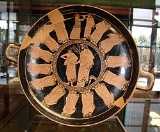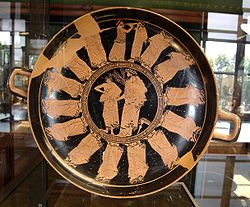
Apaturia
Encyclopedia

Ancient Greece
Ancient Greece is a civilization belonging to a period of Greek history that lasted from the Archaic period of the 8th to 6th centuries BC to the end of antiquity. Immediately following this period was the beginning of the Early Middle Ages and the Byzantine era. Included in Ancient Greece is the...
festival
Festival
A festival or gala is an event, usually and ordinarily staged by a local community, which centers on and celebrates some unique aspect of that community and the Festival....
s held annually by all the Ionia
Ionia
Ionia is an ancient region of central coastal Anatolia in present-day Turkey, the region nearest İzmir, which was historically Smyrna. It consisted of the northernmost territories of the Ionian League of Greek settlements...
n towns, except Ephesus
Ephesus
Ephesus was an ancient Greek city, and later a major Roman city, on the west coast of Asia Minor, near present-day Selçuk, Izmir Province, Turkey. It was one of the twelve cities of the Ionian League during the Classical Greek era...
and Colophon
Colophon
Colophon was a city in the region of Lydia in antiquity dating from about the turn of the first millennium-BC. It was likely one the oldest of the twelve Ionian League cities, between Lebedos and Ephesus and its ruins are in the eponymously named modern region of Ionia.The city's name comes from...
. At Athens
Athens
Athens , is the capital and largest city of Greece. Athens dominates the Attica region and is one of the world's oldest cities, as its recorded history spans around 3,400 years. Classical Athens was a powerful city-state...
the Apaturia took place on the 11th, 12th and 13th days of the month Pyanepsion (mid-October to mid-November), on which occasion the various phratries, or clans, of Attica
Attica
Attica is a historical region of Greece, containing Athens, the current capital of Greece. The historical region is centered on the Attic peninsula, which projects into the Aegean Sea...
met to discuss their affairs.
The name is a slightly modified form of = , the festival of "common relationship". The ancient etymology associated it with ("deceit"), a legend claiming that the festival originated in 1100 B.C. as a commemoration of a single combat between a certain Melanthus, representing King Thymoetes
Thymoetes
In Greek mythology, there were at least three different people named Thymoetes .*Thymoetes, one of the elders of Troy , son of Laomedon. A soothsayer had predicted, that on a certain day a boy should be born, by whom Troy should be destroyed. On that very day Paris was born to Priam, king of Troy,...
of Attica, and King Xanthus
Xanthus
Xanthus may refer to:In Greek mythology:*Divine**Xanthus, the gods' name for Scamander, the great river of Troy and its patron god**Xanthus, one of the twelve sons of Pan who were allied with Dionysus*Human...
of Boeotia
Boeotia
Boeotia, also spelled Beotia and Bœotia , is one of the regional units of Greece. It is part of the region of Central Greece. It was also a region of ancient Greece. Its capital is Livadeia, the second largest city being Thebes.-Geography:...
, in which Melanthus
Melanthus
In Greek mythology, Melanthus was a king of Messenia. He was among the descendants of Neleus expelled from Messenia, by the descendants of Heracles, as part of the legendary "Return of the Heracleidae", later associated with the supposed "Dorian invasion". He fled to Athens, along with other...
successfully threw his adversary off his guard by crying that a man in a black goat
Goat
The domestic goat is a subspecies of goat domesticated from the wild goat of southwest Asia and Eastern Europe. The goat is a member of the Bovidae family and is closely related to the sheep as both are in the goat-antelope subfamily Caprinae. There are over three hundred distinct breeds of...
skin (identified with Dionysus
Dionysus
Dionysus was the god of the grape harvest, winemaking and wine, of ritual madness and ecstasy in Greek mythology. His name in Linear B tablets shows he was worshipped from c. 1500—1100 BC by Mycenean Greeks: other traces of Dionysian-type cult have been found in ancient Minoan Crete...
) was helping him.
On the first day of the festival, called Dorpia or Dorpeia (Δορπεία), banquets were held towards evening at the meeting-place of the phratries or in the private houses of members. On the second, Anarrhysis (from , "to draw back the victim's head"), a sacrifice of oxen was offered at the public cost to Zeus
Zeus
In the ancient Greek religion, Zeus was the "Father of Gods and men" who ruled the Olympians of Mount Olympus as a father ruled the family. He was the god of sky and thunder in Greek mythology. His Roman counterpart is Jupiter and his Etruscan counterpart is Tinia.Zeus was the child of Cronus...
Phratrius and Athena
Athena
In Greek mythology, Athena, Athenê, or Athene , also referred to as Pallas Athena/Athene , is the goddess of wisdom, courage, inspiration, civilization, warfare, strength, strategy, the arts, crafts, justice, and skill. Minerva, Athena's Roman incarnation, embodies similar attributes. Athena is...
.
On the third day, Kureōtis , children born since the last festival were presented by their fathers or guardians to the assembled phratores, and, after an oath had been taken as to their legitimacy and the sacrifice of a goat or a sheep, their names were inscribed in the register. The name is derived either from , "young man", i.e., the day of the young, or less probably from κείρω, "to shear", because on this occasion young people cut their hair and offered it to the gods. The sacrificial animal was called μείον. The children who entered puberty
Puberty
Puberty is the process of physical changes by which a child's body matures into an adult body capable of reproduction, as initiated by hormonal signals from the brain to the gonads; the ovaries in a girl, the testes in a boy...
also made offerings of wine to Hercules
Hercules
Hercules is the Roman name for Greek demigod Heracles, son of Zeus , and the mortal Alcmene...
. On this day also it was the custom for boys still at school to declaim pieces of poetry, and to receive prizes.
According to Hesychius
Hesychius
Hesychius , may refer to:*Hesychius of Alexandria, lexicographer*St. Hesychius of Cazorla, saint, martyr, and bishop*Hesychius of Jerusalem, presbyter and exegete*Hesychius of Sinai, hieromonk and Byzantine author*Hesychius of Antioch...
, these three days of the festival were followed by a fourth, called , but this is merely a general term for the day after any festival.

